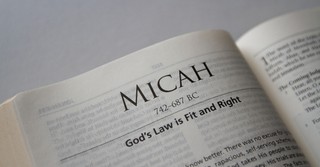
- Recent Translations
- All Translations
Images for Micah 6:8

Related Articles
Micah 6:8 Meaning and Commentary
He hath showed me, O man, what [is] good
This is not the answer of the prophet to the body of the people, or to any and every one of the people of Israel; but of Balaam to Balak, a single man, that consulted with him, and put questions to him; particularly what he should do to please the Lord, and what righteousness he required of him, that would be acceptable to him; and though he was a king, he was but a man, and he would have him know it that he was no more, and as such addresses him; and especially when he is informing him of his duty to God; which lay not in such things as he had proposed, but in doing that which was good, and avoiding that which was evil, in a moral sense: and this the Lord had shown him by the light of nature; which is no other than the work of the law of God written in the hearts of the Heathens, by which they are directed to do the good commanded in the law, and to shun the evil forbidden by it; see ( Romans 2:14 Romans 2:15 ) ; and what doth the Lord require of thee but to do justly;
or "judgment" {e}; to exercise public judgment and justice, as a king, among his subjects; to do private and personal justice between man and man; to hurt no man's person, property, and character; to give to everyone their due, and do as he would desire to be done by; which as it is agreeable to the law of God, so to the light of nature, and what is shown, required, and taught by it: and to love mercy;
not only to show mercy to miserable objects, to persons in distress; to relieve the poor and indigent; to clothe the naked, and feed the hungry; but to delight in such exercises; and which a king especially should do, whose throne is established by mercy, and who is able, and should be munificent; and some Heathen princes, by their liberality, have gained the name of benefactors, "Euergetes", as one of the Ptolemies did; see ( Luke 22:25 ) ; such advice Daniel gave to Nebuchadnezzar, a Heathen prince, as agreeable to the light of nature; see ( Daniel 4:27 ) ; and to walk humbly with thy God?
his Creator and Benefactor, from whom he had his being, and all the blessings of life, and was dependent upon him; and therefore, as a creature, should behave with humility towards his Creator, acknowledging his distance from him, and the obligations he lay under to him; and even though a king, yet his God and Creator was above him, King of kings, and Lord of lords, to whom he owed his crown, sceptre, and kingdom, and was accountable to him for all his administrations: and this "walking humbly" is opposed to "walking in pride", which kings are apt to do; but God can humble them, and bring them low, as Heathen kings have been obliged to own; see ( Daniel 2:21 ) ( 4:37 ) .
F5 (jpvm) "judicium", V. L. Munster; "jus", Junius & Tremellius, Piscator.
